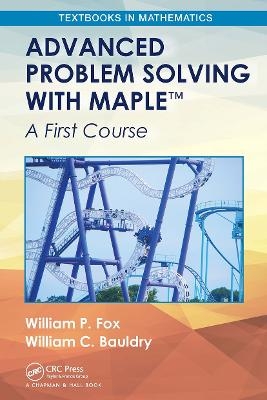
Advanced Problem Solving with Maple
CRC Press (Verlag)
978-1-032-47554-7 (ISBN)
Problem Solving is essential to solve real-world problems. Advanced Problem Solving with Maple: A First Course applies the mathematical modeling process by formulating, building, solving, analyzing, and criticizing mathematical models. It is intended for a course introducing students to mathematical topics they will revisit within their further studies.
The authors present mathematical modeling and problem-solving topics using Maple as the computer algebra system for mathematical explorations, as well as obtaining plots that help readers perform analyses. The book presents cogent applications that demonstrate an effective use of Maple, provide discussions of the results obtained using Maple, and stimulate thought and analysis of additional applications.
Highlights:
The book’s real-world case studies prepare the student for modeling applications
Bridges the study of topics and applications to various fields of mathematics, science, and engineering
Features a flexible format and tiered approach offers courses for students at various levels
The book can be used for students with only algebra or calculus behind them
About the authors:
Dr. William P. Fox is an emeritus professor in the Department of Defense Analysis at the Naval Postgraduate School. Currently, he is an adjunct professor, Department of Mathematics, the College of William and Mary. He received his Ph.D. at Clemson University and has many publications and scholarly activities including twenty books and over one hundred and fifty journal articles.
William C. Bauldry, Prof. Emeritus and Adjunct Research Prof. of Mathematics at Appalachian State University, received his PhD in Approximation Theory from Ohio State. He has published many papers on pedagogy and technology, often using Maple, and has been the PI of several NSF-funded projects incorporating technology and modeling into math courses. He currently serves as Associate Director of COMAP’s Math Contest in Modeling (MCM).
*Please note that the Maple package, "PSM", is now on the public area of the Maple Cloud. To access it:
• From the web:
1. Go to the website https://maple.cloud
2. Click on "packages" in the left navigation pane
3. Click on "PSM" in the list of packages.
4. Click the "Download" button to capture the package.
• From Maple:
1. Click on the Maple Cloud icon (far right in the Maple window toolbar).
Or click on the Maple Cloud button on Maple's Start page to go to the website.
2. Click on the "packages" in the navigation pane
3. Click on "PSM" in the list of packages.
The package then downloads into Maple directly.
Dr. William P. Fox is an emeritus professor in the Department of Defense Analysis at the Naval Postgraduate School. Currently, he is an adjunct professor, Department of Mathematics, the College of William and Mary. He received his Ph.D. at Clemson University and has many publications and scholarly activities including twenty books and over one hundred and fifty journal articles. William C. Bauldry, Prof. Emeritus and Adjunct Research Prof. at Appalachian State University, received his PhD in Approximation Theory from Ohio State. He has published many papers on pedagogy and technology, often using Maple, and has been the PI of several NSF-funded projects incorporating technology and modeling into math courses. He currently serves as Associate Director of COMAP’s Math Contest in Modeling (MCM).
Introduction to Problem Solving and Maple
Problem Solving
Introduction to Maple
The Structure of Maple
General Introduction to Maple
Maple Training
Maple Applications Center
Introduction, Basic Concepts, and Techniques in Problem Solving with First Order, Ordinary Differential Equations
Introduction
Applied First Order Differential Equations and Solution Methods
Slope Fields and Qualitative Assessments
Analytical Solution of 1st Order ODEs
First Order ODEs and Maple
Numerical Methods for 1st Order ODEs
Introduction, Basic Concepts, and Techniques in Problem Solving with Systems of Ordinary Differential Equations
Systems of Differential Equations
Applied Systems of Differential Equations
Phase Portraits and Qualitative Assessment
Solving Homogeneous and Non-Homogeneous Systems of ODEs
Numerical Solutions to Systems of Ordinary Differential Equations
Problem Solving with Linear, Integer, and Mixed Integer Programming
Formulating Linear Programming Problems
Understanding Two-Variable Linear Programming: A Graphical Simplex
Solving the Linear Program: The Simplex Method and Maple
Linear Programming with Internal Maple Commands
Sensitivity Analysis with Maple
Integer and Mixed Integer Problems with Maple
Model Fitting and Linear Regression
Introduction
The Different Curve Fitting Criterion
Plotting the Residuals for a Least-Squares Fit
Case Studies
Statistical and Probabilistic Problem Solving with Maple
Introduction
Basic Statistics: Univariate Data
Introduction to Classical Probability
Reliability in Engineering and Business
Case Study: Airlines Overbooking Model
The Normal Distribution
Confidence Intervals and Hypothesis Testing
Problem Solving with Simulation
Introduction
Monte Carlo Simulation
Probability and Monte Carlo Simulation Using Deterministic Behavior
Probability and Monte Carlo Simulation: Using Probabilistic Behavior
Case Studies: Applied Simulation Models
Index
| Erscheinungsdatum | 11.01.2023 |
|---|---|
| Reihe/Serie | Textbooks in Mathematics |
| Zusatzinfo | 107 Illustrations, black and white |
| Verlagsort | London |
| Sprache | englisch |
| Maße | 156 x 234 mm |
| Gewicht | 500 g |
| Themenwelt | Mathematik / Informatik ► Informatik ► Theorie / Studium |
| Mathematik / Informatik ► Mathematik ► Analysis | |
| Mathematik / Informatik ► Mathematik ► Angewandte Mathematik | |
| ISBN-10 | 1-032-47554-4 / 1032475544 |
| ISBN-13 | 978-1-032-47554-7 / 9781032475547 |
| Zustand | Neuware |
| Informationen gemäß Produktsicherheitsverordnung (GPSR) | |
| Haben Sie eine Frage zum Produkt? |
aus dem Bereich


